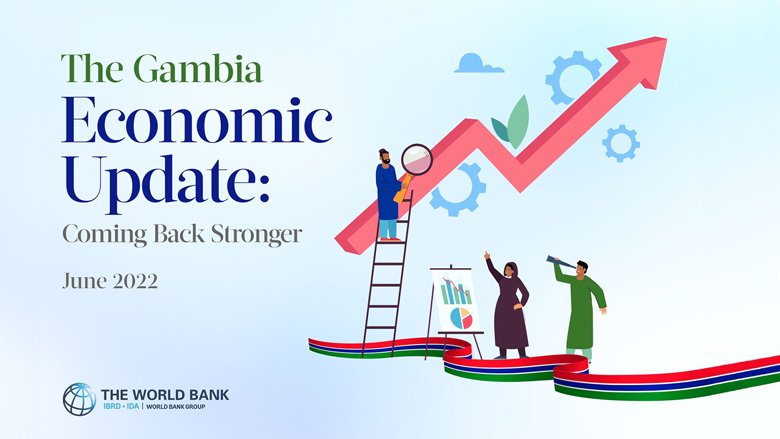Banjul, 6 June 2022: According to the World Bank's second Economic Update on The Gambia, the country came through the pandemic more unscathed than many of its regional and similarly tourism-dependent peers. Even as number of tourists collapsed, the economy has been supported by a strong agricultural performance, international support measures, and record levels of official remittances which in turn have driven private sector investment. However, just as it suffered less in 2020 than its peers, its recovery in 2021 has been more tentative, exposing some of the long-standing structural issues in the economy.
The report, Coming Back Stronger, notes that the economy started to recover in 2021 but it faces widening fiscal and current account deficits as emergency donor support is withdrawn and the tourism industry still has not returned to its pre-pandemic levels. With elections out of the way, business confidence has returned, but solid governance reforms and strong public financial management will be key to securing The Gambia’s future. It remains vulnerable to future shocks such as new COVID-19 variants and weather-related risks, while the outlook is further dampened by the risk of contagion from the war in Ukraine. Although the country’s direct links with Russia and Ukraine are limited, the war is already increasing prices of food, fertilizer, and fuel and threatens to put the brakes on the global recovery, especially in its key tourism market, Europe.
“As the immediate impact of the pandemic recedes, The Gambia looks set for modest growth in the medium term, driven by a rebound in tourism, investment, and agriculture. However, a low vaccination rate, weather-related risks to agriculture, and the rising cost of living globally, exacerbated by the war in Ukraine, could slow the recovery”, said Mehwish Ashraf, World Bank Country Economist and lead author of the report. “A widening current account deficit, rising inflation eroding household incomes, and high fiscal deficits leading to domestic borrowing, could threaten the sustainability of the recovery and hinder poverty reduction.”
The report therefore recommends actions to strengthen governance and institutional structures, build fiscal resilience to respond to future shocks, and address the binding constraints of underinvestment, low productivity and lack of diversification that are preventing the economy from reaching its full potential.
The pandemic has left its mark on the population, and particularly human capital. School closures have taken their toll, especially among households that were reliant on school meals, and food insecurity is rising. In a special section on the use of evidenced-based policies to help prevent this scarring become permanent, the report highlights three key priority areas where the use of data—and, more importantly, its reuse—can ensure the best use of scarce fiscal resources.
- In the area of social protection, the pandemic highlighted shortcomings in data collection which made it difficult to target support for the households that needed it most.
- In the education sector, efforts to improve data collection systems have started to pay off as the Government has access to information to support better decision making. However, data gaps are still making it hard to address poor student outcomes and provide real-time accountability especially to communities.
- In the health sector, better integrated data systems are already underlining the importance of primary health care. Digitization and further integration with wider data sources will be key to realising the country’s ambition to provide universal health coverage.

